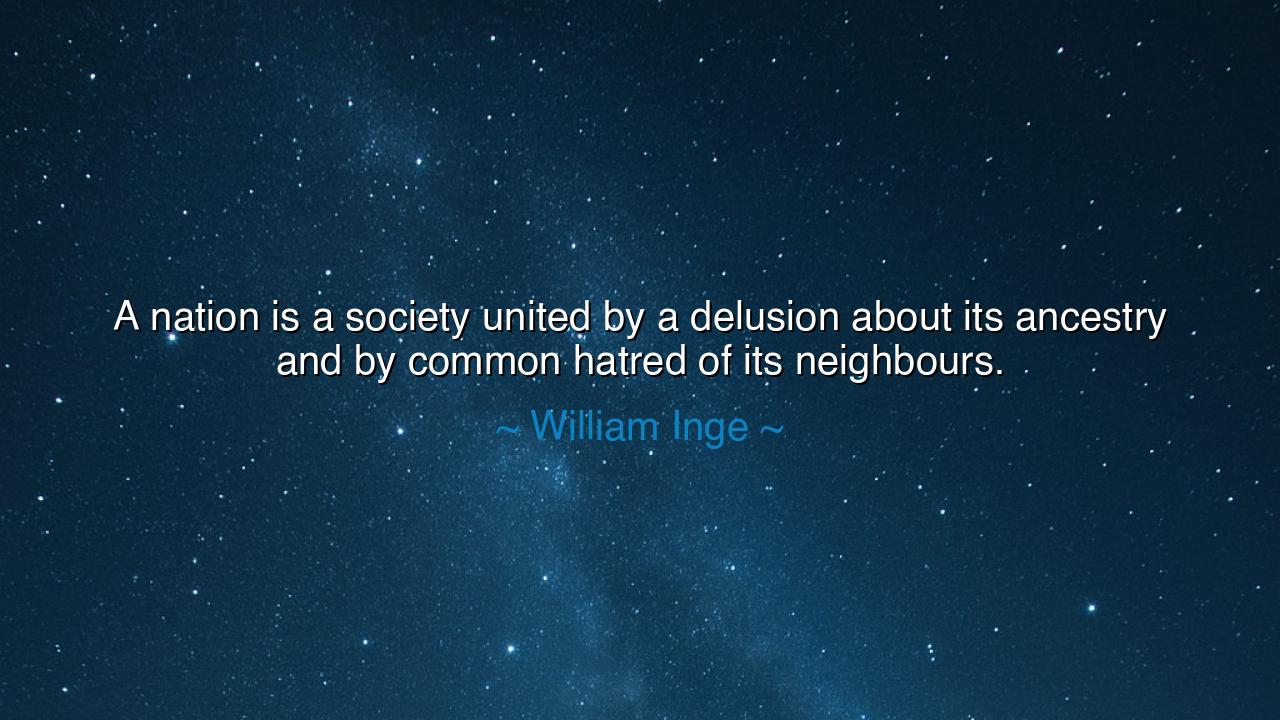
A nation is a society united by a delusion about its ancestry
A nation is a society united by a delusion about its ancestry and by common hatred of its neighbours.






William Inge, the English divine and thinker, once gave the world a sentence heavy with irony and bitter truth: “A nation is a society united by a delusion about its ancestry and by common hatred of its neighbours.” These words are no idle jest, but a piercing observation upon the frailty of human pride. In them, Inge strips away the splendid banners and lofty anthems, revealing the uneasy foundation upon which many nations stand: myths woven of ancestry, and hatred fostered toward the other. His warning is sharp, for it shows us that what often binds a people together is not always love of truth, but illusion and enmity.
The first part of his saying speaks of delusion about ancestry. Nations, in their hunger for identity, often glorify their origins. They weave legends of golden founders, of noble blood, of chosen destinies. These stories inspire, but they are seldom pure truth. The Romans claimed descent from Aeneas, son of Venus, though their empire was built as much by slaves and exiles as by gods. The French traced their line to Trojan heroes, while the English cherished myths of Arthur. These tales comfort the people, give them unity, and lift their hearts—but they are illusions, not history. Yet Inge reminds us that such illusions, though false, are powerful enough to bind multitudes together.
The second part of his saying speaks of common hatred of neighbours. For when myths fail to unite, enmity often does. Peoples have long defined themselves not only by what they are, but by what they are not. The Greeks despised the “barbarians,” and in that contempt, found solidarity. The French and English, though sharing much, nursed centuries of war, each defining itself in opposition to the other. Even in our modern age, when we boast of enlightenment, we see nations rallying their citizens by pointing to the foreigner, the outsider, the rival. Thus hatred becomes a poor substitute for true unity, binding men together in anger rather than in love.
Consider the tragic example of the Balkans in the 1990s. Peoples who had lived side by side for generations suddenly tore one another apart. Ancient myths of ancestry—of who belonged first to the land, who carried the truer blood—were revived. Hatreds long buried flared into violence, and neighbours who had once shared bread became enemies. Inge’s words found flesh there, for nations were not held together by justice or brotherhood, but by delusions and hatreds. What was built on these poisons collapsed into bloodshed.
Yet Inge’s words, though harsh, need not drive us to despair. They serve as a mirror, that we may see clearly what lies beneath the surface of national pride. A nation need not be built only upon delusion and hatred; it may be built upon shared ideals, upon justice, upon compassion, upon truth. But such a nation requires effort greater than myth-making or hatred-stirring. It requires leaders who speak honestly, teachers who cultivate wisdom, and citizens who choose unity not against others, but for the sake of each other.
The lesson is thus: examine the roots of your identity. Do not be seduced by false tales of ancestry, nor let your heart be chained by hatred of the other. Love your homeland, yes, but love it enough to seek truth rather than comfort. A nation that relies only on myths and enemies is fragile, like a house built on sand; but a nation built on truth and justice shall endure, like a temple set upon rock.
Therefore, in your own life, seek to build community not on illusion or enmity, but on shared good. Tell the stories of your people, but tell them with honesty. Celebrate your culture, but without despising your neighbour’s. When leaders call you to hate, remember Inge’s warning: hatred may bind for a moment, but it corrodes in the end. Choose instead the higher patriotism, which is not a delusion nor a hatred, but a devotion to justice, compassion, and truth.
So let Inge’s words be to you as both warning and call. A nation, he tells us, may unite by delusion and hatred—but you may choose to live otherwise. And if enough choose the higher way, then perhaps one day nations themselves may be bound, not by lies and enemies, but by truth, peace, and the shared dignity of all humankind.






AAdministratorAdministrator
Welcome, honored guests. Please leave a comment, we will respond soon